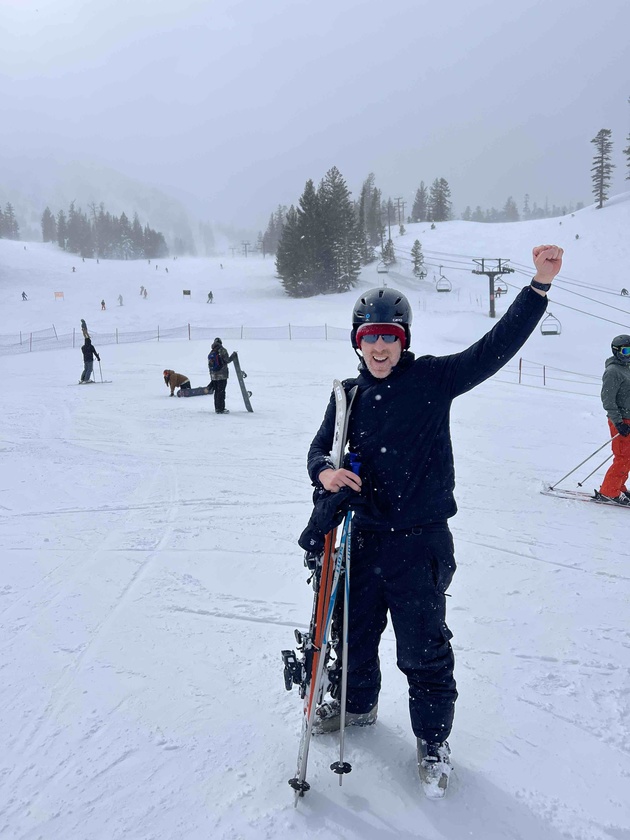Yesterday, I went downhill skiing for the first time. I grew up skiing cross-country in the Chicago suburbs every winter -- we even had our own skis -- but my dad forbade us from downhill skiing. He is a doctor and had seen too many injuries to feel comfortable about it.
So I have always looked at skiing as something that other people did. It was too expensive, too cumbersome, and too dangerous. I love the snow, and I have taken my kids to the mountains for sledding, etc., for several winters in a row, but I had never tried downhill skiing.
To make a long story short, a unique opportunity arose on Thursday. There seemed to be a break in the rainy, snowy weather; the schools were on strike; and there is a new airline, Advanced Air, that runs a daily flight to and from L.A. and Mammoth Mountain, up north.
I decided to take the plunge -- and it was expensive -- and brought my two elder children along. Initially I had just wanted to see the snow, but then I thought of signing them up for ski lessons; they, at least, should learn. And then I thought: why shouldn't I try, too?
So I scheduled a lesson. And I nearly missed it: the rentals and so on took so long that by the time I had taken my kids to their lessons, I was already 45 minutes late for mine. But I met a kind ski instructor who agreed to teach me -- starting from the most basic skills.
I learned quickly. (She told me that I was the quickest student she had ever had.) I should have been afraid, but I wasn't -- partly because I had no time to be afraid, partly because I trusted my instructor, and partly because I really, really wanted to do this.
Within an hour, she was taking me up on a ski lift -- in blustering, blizzard conditions. I wished I could have taken photographs with my phone, but I did not want to drop it -- or to lose a ski pole. I took it all in -- the forest, the snow, the mountain and all of its mysteries.
I began to cry. I was so moved by the beauty of it, and by the fact that I was doing something that I had always believed was not for me. We reached the top and I began skiing down -- and I could do it. And it was so beautiful, with big, fat snowflakes falling all around.
I cried once more on the way down, and again as I said goodbye to my instructor. I told her that she had changed my life -- not just because I can now ski, but because I had confronted a lifelong fear. The sun came out; we flew back to L.A. 2 hours later, transformed.

This week’s portion launches the great story of Abraham, who is told to leave everything of his life behind — except his immediate family — and to leave for “the Land that I shall show you.”
There’s something interesting in the fact that Abraham is told to leave his father’s house, as if breaking away from his father’s life — but his father, in fact, began the journey, moving from Ur to Haran (in last week’s portion). His father set a positive example — why should Abraham leave him?
Some obvious answers suggest themselves — adulthood, needing to make one’s own choices, his father not going far enough, etc.
But I think there is another answer. Abraham (known for the moment as Abram) needs to establish his own household. This is not just about making one’s own choice, but really about choosing one’s own starting point. It’s starting over.
Sometimes we start over in fundamental ways even if much that surrounds us remains the same. Sometimes the journey we have to ...
The story of Noah is familiar; the details, less so.
Noah is often seen as an ambivalent figure. He was righteous -- but only for his generation. What was his deficiency?
One answer suggests itself: knowing that the world was about to be flooded, he built an Ark for the animals and for his own family -- but did not try to save anyone else or to convince them to repent and change their ways (the prophet Jonah, later, would share that reluctance).
Abraham, later, would set himself apart by arguing with God -- with the Lord Himself! -- against the destruction of Sodom and Gomorrah, saying that they should be saved if there were enough righteous people to be found (there were not).
Still, Noah was good enough -- and sometimes, that really is sufficient to save the world. We don't need heroes every time -- just ordinary decency.
Hi all -- as I noted last month, I'm going to be closing down my Locals page, at least for tips and subscriptions -- I may keep the page up and the posts as well, but I'm no longer going to be accepting any kind of payment.
Look for cancelation in the very near future. Thank you for your support!












